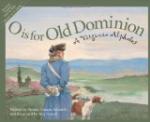There was a break in the tree-fringe on the north bank of the James. A sea-wall extended along the water’s edge, and from either end of it a brick wall ran far inland. Within the spacious enclosure, the grounds swept back and up from the river, with noble trees and close-cut lawn; and crowning the slope stood the beautiful old mansion. A stately central building of red brick, with dormer windows in its steep-pitched roof, rose between low flanking corridors and wings like some overlord with his faithful vassals in attendance. In neutral brown the quiet river, in shadowy green the sloping lawn, in dull red and gleaming white the lofty, many-windowed front of Westover—a picture that drew Gadabout in close to the shoals that day.
The bit of history that goes with the picture gives us many glimpses of old-time elegance and romance, and helps us to a good idea of some of the pretentious phases of colonial life. It runs in this way.
Back in the beginnings of things American, when the dissatisfied planters at James Towne were starting out to establish their estates along the river, these lands by Herring Creek attracted attention. Under the name of Westover they soon became the property of the Byrd family, and rose to prominence among colonial estates in connection with the fortunes of that distinguished house.
The golden age of Westover was in the days of the second William Byrd, who was one of the most striking figures of colonial times. Handsome, learned, witty, and capable; with exquisite taste and elegant culture fashioned in the friendship of English noblemen; with almost endless acres and boundless wealth—a cavalier of cavaliers was this London-bred Virginian.
[Illustration: Riverward front of Westover.]
It is surprising that this beau-ideal should have remained spouseless for two years after coming into his estate. He must have been considered the most fascinating matrimonial possibility in the colony. One can imagine how in a gathering of Virginia maidens intent upon their tambour embroidery, when the name of Westover’s young master came up, a circle of eyelashes went down and a circle of tender hearts went both up and down. The prize was finally won by Lucy Parke, daughter of Colonel Daniel Parke whose portrait hangs at Brandon.
Some years later, family litigation called Colonel Byrd to England, where his wife and little daughter, Evelyn, joined him, and where his wife soon died. The residence in London continued for a number of years; and resulted in giving the Colonel a new wife in the person of a rich young widow, and in giving social finish and a broken heart to Evelyn Byrd.
Under the guidance of her father, she was educated after the manner of the fashionable life of that day. It must have been a time quite to the elegant Colonel’s liking when London turned in admiration to his daughter; when, but sixteen and already crowned with social successes, the cultured beauty from the plantation on the James was presented at the English Court.




